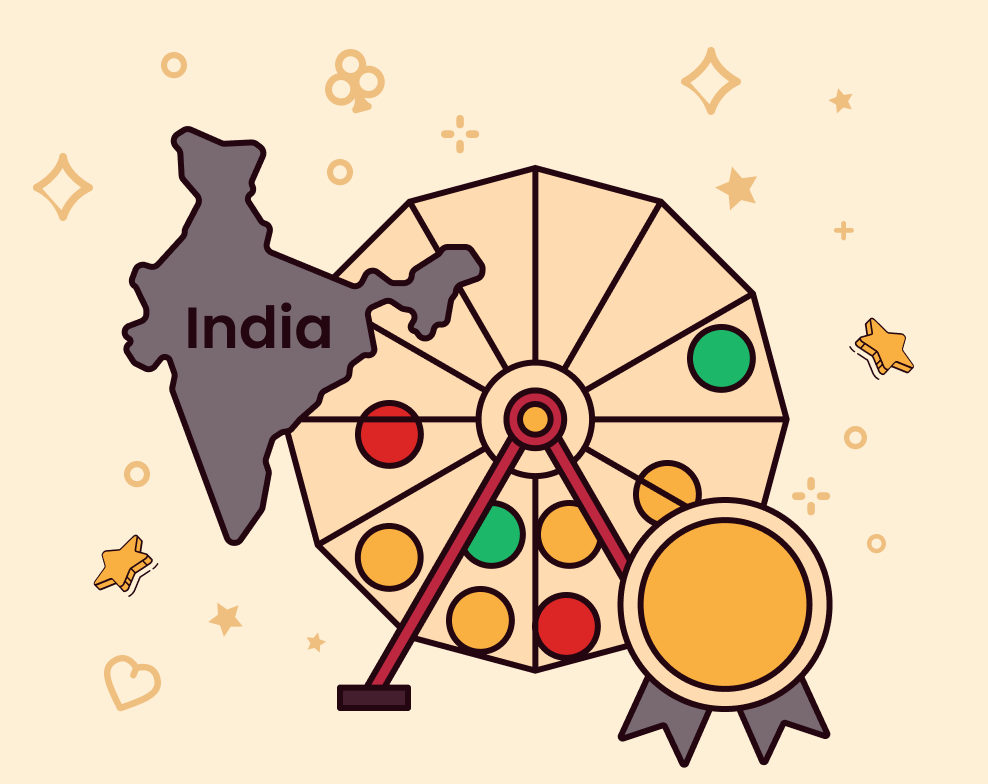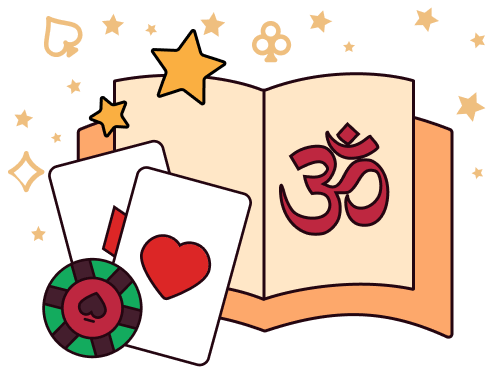
India’s iGaming world has taken a 360-degree turn with the complete revolutionisation of the gambling industry in recent years. Today, with a click of a button on your smartphone, you can dive deep into the world of online gambling.
A survey report revealed that there are 759 million active internet users in India (71% of the country), and by 2025, this figure is expected to hit 900 million. The growing number of mobile devices with fast internet, such as 5G, will boost the iGaming industry. Almost 31 million smartphone users upgraded to 5G in 2023, and 39% are willing to pay more for higher data usage on these plans.
As high-speed internet becomes more accessible, we expect to see a shift from land-based casinos to online casinos, which allow gamblers to play from the comfort and convenience of their homes or while on the move. Let’s take a look at how India’s gambling industry has transformed over the years and shifted towards a modern gambling system.
Historical glimpse into gambling in India
Gambling in India dates back to between 7300 BC and 300 BC. The gambling events in India historically took place in the following manner:
1. 7300 BC to 430 BC
Two ancient Hindu books, Ramayana and Mahabharata, discuss games of chance or gambling dating back to 7300 BC. Historians have provided an initial date of 430 BC, but gambling is still older than this period. These two ancient books describe the game of chess played with dice, which was popularly known as Chausar or the Sanskrit name, “Chaturaji”.
The game had four players and was played using two dice. According to the Mahabharata, Indians placed large bets on this game of chance. Later, the game “Passa” replaced it, and players used astragali, a uniquely shaped compact bone, to play. These were a mix of huckle bones derived from mammals, which would have been twice the size of modern dice.
2. Prince Yudhishthira’s exile and first sports betting (300 BC)
The Mahabharata reveals how a game of dice known as Chaturanga, resulted in the exile of Prince Yudhishthira and his four brothers between the 7th and 12th century. It was played between two groups of warring families (the Pandavas and Kauravas) and resulted in the Pandavas losing their entire kingdom, wealth, and even their clothes (as per the ancient Hindu epic).
Another Indian gambling form that emerged during this time was sports betting. While different to modern sports betting games, villagers placed bets on animals e.g. horse racing, cock fights, and ram fights.
3. 15th to 18th century gambling
Land-based Indian casinos began emerging between the 15th and 18th centuries. These venues had to follow strict regulations and players had to pay a tax called “chauth”. The British introduced Indians to cricket in the mid-18th century, which later became the foremost betting choice for sports in India. It’s popularity also gave rise to the establishment of the Public Gambling Act of 1867, a legislation aimed to punish public gambling and the keeping of common gaming houses.
4. Gambling at present
During the 20th century, the government imposed heavy restrictions on states and territories offering gambling in India. The TN Act was also introduced to prohibit online gambling. However, gambling remains a grey area as every state has the right to govern gambling activities separately.
Currently, only three Indian states legally permit land-based and online gambling: Goa, Daman, and Sikkim. That said, games of skill, such as rummy and poker, are generally considered legal across the country under Indian law.
Still, many Indians play casino games at black market casinos. An estimated $60 billion per year goes to black market casinos in India. Separate data also shows that 40% of active internet users in India gamble on online casino platforms.

Forms of gambling practised traditionally in India
The most common forms of traditional gambling practised in India are:
Lottery
Horse racing
Video poker
Raffle tickets
Bingo
Instant scratch cards
The sports betting market in India has been flourishing for the past few years, with cricket and the Indian Premier League (IPL) attracting a significant number of bettors. Nearly 340 million Indians bet on IPL league matches. Bets on horse racing in India is also growing at an unprecendented rate, with the industry estimated to be worth ₹300 crore.
Sports betting revenue has already reached $1.70 billion, and by 2027, it is expected to grow to $2.47 billion, with the average number of bettors expected to hit 17.4 million in the same year.
Besides sports, traditional gambling games such as lottery, horse racing, and rummy hold a major share of the market. The number of lottery players in India almost hit 4.2 billion in 2023, with the government reporting an average revenue of ₹1 billion month-on-month in sales.

When did online betting emerge in India?
Although the digital revolution lead to an influx of online betting in the late 20th century, it wasn’t until 2008 when the first Indian state enacted regulations permitting legal online gambling. Fast forward to today and you can now play casino games and bet on sports from anywhere, anytime.
The online gambling market in India showed a tremendous increase in the number of players between 2010 and 2018. In 2018, the revenue generated by the online gambling market reached ₹43.8 billion. The forecasted periods show a CAGR of 22.1%, with online gambling growth estimated to hit $2.90 billion (₹240.4 billion) by 2024.
The primary reason for this growth is the penetration of smartphones in India. The introduction of the LTE 4G network, and now 5G internet services, has made gambling easier for Indians. The mobile app economy of the country is estimated to equal 12% of GDP by 2030, and with 30% growth year-on-year in the gamers market, staticians expect 700 million 5G subscriptions by 2028.
Indians should note that online gambling winnings will be subject to a 28% GST, as announced by the government. Before depositing real money, be sure to read expert casino reviews to ensure you play at reputable gambling sites.
Laws regulating online gambling in India
Gambling in India has been regulated since the colonial era, with the Public Gambling Act 1867 and the Prize Competitions Act 1955 after the country gained independence. Gambling is already on the State List, meaning the central government has given states the freedom to enact online gambling laws.
According to the 7th Schedule of the Indian Constitution, Entries 34 and 62 from List II state that Indian states will approve the strict gambling laws. Most states, such as Tamil Nadu, Karnataka, Kerala, Delhi, Haryana, etc., have enacted strict gambling laws. However, Meghalaya, Sikkim, Nagaland, Maharashtra, and Goa allow online and offline gambling.
The newer online gambling legislation exempts games of skill from any criminal proceedings. Players can still play at online gambling sites, but these must be licensed and regulated by gambling authorities. These sites must accept Indian players and allow payments in Indian currency.
Be sure to check the gambling laws of the region you intend to gamble in before placing wagers online. If you are playing from the banned state, you will be charged a fine of ₹5 lakh and face imprisonment of one year. Any person found providing online gambling services in banned states will face three years in prison and a fine of ₹10 lakh.
Benefits of choosing online gambling platforms
Convenience: Play from the comfort of your home or on the move. You can log in with your username and password to place real money bets. Players only require an Android, iPhone, laptop, or PC and a strong internet connection.
Access to entertainment: Gamblers will get access to a wide variety of casino games. You can play live casino games, slots, table games, poker, bingo, etc. Sports betting is also available at reputed and licensed casino platforms.
Cryptocurrency: Modern online casinos support crypto betting. Bet with various cryptocurrencies, including Bitcoin, Ethereum, and Altcoins. Crypto adds an extra layer of anonymity and security.
Fairness and security: Only play at regulated online casinos for added security and fair gameplay. Most reputed casinos also use up to 256-bit SSL encryption to protect your financial and personal details.
Live streaming: Live streaming allows you to bet on sports events in real time, meaning you can change your bets as you play. Similarly, live casino games allow you to play classic table games and immersive game shows as the action unfolds, thanks to HD streaming.
Future of India’s gambling transformation
The rapid evolution of the Indian gambling system shows its willingness to embrace technological innovations. Online casinos offer Indians a new way to enjoy betting in a digital world. Players must, however, check the regulations of the state they reside in before playing online to avoid facing legal repercussions.
The Latest News
Learn more about online gambling and the best casinos in India by reading our dedicated guides:


Ana D.
•May 30, 2024
Lotteries and other forms of gambling have a colourful history in India. While lotteries are regulated under a central umbrella, how they are managed is subject to the discretion of state governments. However, the growing popularity of lotteries saw the Lotteries (Regulation) Act of 1998 and the Lotteries (Regulation) Rules 2010 introduced, which established detailed standards for the governments to follow.
Currently, lottery games are legal in 13 Indian states, though anyone of legal gambling age in India can buy international lottery tickets online. The ticket prices and prize pools of government lotteries in India vary depending on the lottery scheme and state in which it is regulated. Tickets for weekly draws begin at modest prices like ₹2 or ₹5 and increase for bumper draws and special schemes.


Ana D.
•May 30, 2024
Welcome to the ultimate guide celebrating the best kabaddi players of all time. Discover which kabaddi superstars have made it onto our coveted top 10 list.


Akil Khan
•March 21, 2024
Whether you like it or not, luck plays a crucial role in gambling. And while many would argue that it’s an unreliable force, for many Indians, the ancient tradition of Vedic astrology offers a way to understand how luck works in the universe and how one could potentially manipulate it to work in one’s favour.
Vedic astrology (known as Jyotish in Sanskrit) is the practice of studying planetary positions, celestial influences, and karmic patterns to understand how these influence and shape human lives and destinies.
When it comes to gambling, some Indians look to Vedic astrology to boost their chances of success. By analysing astrological charts and horoscopes, and identifying cosmic connections, gamblers seek to find the most advantageous time to gamble, looking for lucky combinations of numbers, or even charms and rituals to help improve their chances.
Let’s look at this more closely:
Planetary configurations
"Muhurtha", an essential principle of Vedic astrology, indicates the opportune time to partake in certain activities based on planetary configurations. It also highlights when best to avoid certain activities. So, in the case of gambling, a player would wait for a favourable Muhurtha to maximise their chances of success.
Presence of the planets
Vedic astrology focuses on nine “grahas”, which are collectively referred to as the “navagrahas” (nava meaning nine). They include the sun (Surya), moon (Chandra), Mars (Mangala), Mercury (Budha), Jupiter (Brihaspati), Venus (Shukra), Saturn (Shani), Rahu (north node of the moon), and Ketu (south node of the moon). According to Vedic astrology, the planet Venus offers luxury and Jupiter provides immense wealth. A conjunction of Jupiter and Venus unafflicted with the moon is therefore said to bring good luck and prosperity.
Birth charts
Many Indians strongly believe in analysing their birth chart in every aspect of their life. This comes from Vedic astrology, which argues that the alignment of different celestial bodies at your birth can provide invaluable insights. In the case of betting, it could highlight a person’s gambling and risk-taking tendencies and subsequent strategies they could employ to maximise their chances of winning, translating into profits and success.
Astrology and numerology
Hindus love to rely on their favourite numbers, particularly when it comes to gambling, and generally prefer odd numbers over even. Seven and eight are considered auspicious numbers, representing success and prosperity. Many Hindus also use these numbers at the time of Diwali when, in some houses, gambling is a ritual. Another lucky sequence of numbers in Hinduism is 786, representing the Trinity of Brahma, Vishnu, and Shiva.